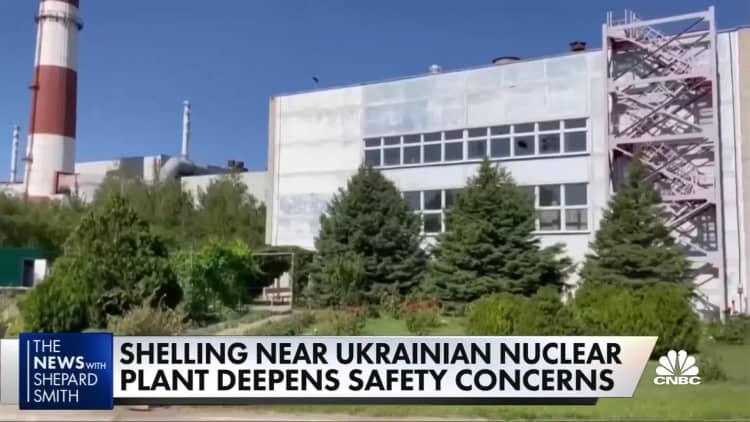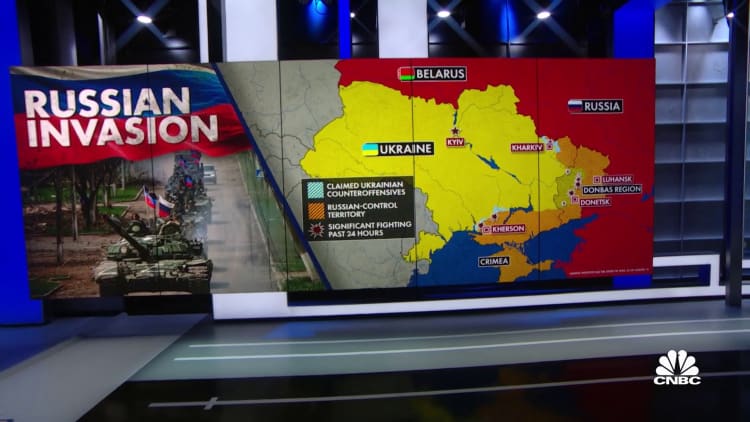Russia's Ministry of Defense warned Thursday that if an accident occurs at the nuclear power plant it is occupying in southern Ukraine, radioactive material would cover Germany, Poland and Slovakia.
Igor Kirillov, head of Russia's radioactive, chemical and biological defense forces, said the plant's backup support systems had been damaged as a result of shelling, Reuters reported, and that several countries in Europe could be at risk if there was an accident.
The warning on Thursday came as tensions over the status of the Zaporizhzhia nuclear power plant came to the fore, with the fate of the facility — Europe's largest nuclear power plant — set to be discussed at talks between the U.N.'s secretary-general, Antonio Guterres, and Ukrainian President Volodymyr Zelenskyy on Thursday.

Both Russia and Ukraine have repeatedly accused each other of shelling the power plant.
Russia's Defense Ministry said Thursday that it may shut down the nuclear plant if Ukrainian forces continued to shell the facility. Ukraine denies shelling the plant and instead blames Russia for endangering the facility, saying it is storing ammunition and military equipment there.
International warning
Ukraine and the international community have warned of the potential for a catastrophic accident at the plant and on Wednesday, Ukraine's Emergency Ministry conducted a nuclear catastrophe exercise in the city of Zaporizhzhia, which is located in southeastern Ukraine on the Dnipro River, in case of an accident.
Zelenskyy said Wednesday night that Ukrainian diplomats and nuclear scientists are in "constant touch" with the International Atomic Energy Agency and working to get a team of inspectors into the plant which has been occupied by Russian troops since the early stages of the war.
Tensions over the plant have risen in recent weeks with Ukraine accusing Russia of using the facility as a shield and part of a "nuclear blackmail" strategy. Ukrainians still working at the facility say they are effectively hostages there, telling the BBC last week that they were being kept at gunpoint.
The game of cat and mouse over the plant continued Thursday with Russia's Ministry of Defense claiming on Telegram that Kyiv was planning a "provocation" at the power plant during Guterres' visit, saying that "as a result of which the Russian Federation will be blamed for creating a man-made disaster at the power plant."

The ministry added that, "in order to prepare for the provocation," it was deploying radiation observation posts near Zaporizhzhia and organizing training exercises for a number of military units in the region "on measures to be taken in conditions of radioactive contamination of the area."
Russia presented no evidence for its claim and has often been accused of "false flag" operations.
Ukrainian presidential advisor Mykhailo Podolyak said on Twitter that if Russia was concerned about a disaster at the plant, it could remove its troops immediately.
What could happen?
The possibility of an accident at Europe's largest nuclear power plant is a terrifying prospect for Ukraine, a country that still lives with the scars of the 1986 Chornobyl disaster, which remains the world's worst nuclear accident and one which led to radioactive material spreading across Europe.
"Probably more than any country in the world, Ukraine is aware of the consequences of an explosion and fire at a nuclear power plant," Antony Froggatt and Patricia Lewis, environment and security experts from U.K. think tank Chatham House, said in research last week looking at what is at stake in Zaporizhzhia's case.
However, they noted that Zaporizhzhia's reactors are different to those that were in Chornobyl but that, nonetheless, an accident at the plant could have significant consequences for Ukraine.
"Zaporizhzhia uses enriched uranium, its current VVER [water-water energetic reactors] reactors are not moderated by graphite, but by water, which means they are safer and will not burn in the way of Chernobyl," they said.

Modern reactors in Ukraine, like Zaporizhzhia, are also surrounded by a secondary containment system — a hard concrete shell designed to withstand explosions and a crashed airplane, they noted.
"However, it is unclear as to how effective they would be against attacks as the thickness of the containment wall in this design of reactor is traditionally 1.2 metres thick, and a thickness of around two metres is required for new construction projects," they said.
They noted, however, that radioactive material at Zaporizhzhia is also stored in the spent fuel pools (or ponds), where used fuel is kept underwater to cool and to allow radiation levels to fall before being moved to a final store.
"If coolant is lost from the ponds, either by a direct hit which breaches containment structures or by a meltdown of the core due to losses of power, the stored fuel will heat up. If the temperature rises above around 900 degrees Celsius, the cladding around the zirconium cladding will ignite, leading to the spreading of radioactive material," they warned.
While any release of radioactive isotopes could be "catastrophic" for the surrounding areas, Froggatt and Lewis said that "because of the type of reactors at Zaporizhzhia, the impact would likely be nowhere near as severe as the 1986 Chernobyl disaster and more likely be similar in scale to the 2011 Fukushima nuclear crisis."


